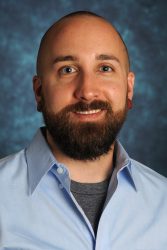
Tell us a little about yourself. What is your position here at NMSU, and what are your research interests?
I got my bachelor's at the University of Pittsburgh and then my master's degree and PhD from Arizona State before coming to NMSU in 2013. Currently, I’m an Associate Professor in Psychology, but at the moment I'm on professional leave while acting as a Program Director at the National Science Foundation where I co-run the Perception, Action, and Cognition program and the Cognitive Neuroscience program (as well as being involved with lots of other interdisciplinary programs too). I’m maintaining my labs and mentorship while I’m gone, however, and I return in Fall 2022. My research interests are broad, but center around visual attention, perception, and memory, but also eye movement control, similarity perception, and development of computational models.
How do you define data science?
I'm not sure I've ever given much thought to defining it, but I guess I'd say that it involves lots of fields and techniques that allow one to prepare, analyze, and make sense of acquired data.
How do you incorporate data science techniques into your research?
Most of what I do is data science. As a Cognitive Psychologist, empirical work and simulations/models are the core of our field. So, I’m constantly analyzing behavioral data, oculomotor data, running simulations, etc.
In what ways has data science allowed you to do research that would not be possible with traditional methods in your field?
Data science is the norm in cognitive psychology and cognitive science more broadly. There are lots of variations on what individual researchers do with their data, of course, and learning more advanced (e.g., less traditional) techniques might allow one to go further with their research. But it’s certainly already traditional for people interested in cognition to adopt data science as part of their repertoire.
How did you first discover data science, and what training (formal or informal) did you receive in it?
In graduate school I got a lot of training in statistics. Most of this was null-hypothesis significance testing focused, but I also started to learn about Bayesian statistics there too. It was part of our core curriculum, but then we all just sort of added new techniques and procedures as they became important to our research. I picked up multi-dimensional scaling, for instance, and started incorporating it into my research quite a bit. And then towards the end of my PhD I started trying to learn some rudimentary computational modeling and do some simulation work. Since then I’ve been trying to read up on machine learning and other "big data" techniques that are becoming more and more important to cognitive scientists.
What data science skill sets do you think are particularly important/beneficial for graduate students looking to work outside of academia—say, in industry or the public sector?
Programming, undoubtedly. For both in and outside of academia, I can think of no more important skill to learn.
A student wants to get into data science but they don’t know where to start. What advice would you give?
Take some time to learning programming if you can, whether that be by taking a university course or even just learning at home with books, apps, Youtube, whatever. And if you have access to people who do that sort of thing a lot – professors, graduate students, whoever – ask to "look over their shoulder" some. Programming can seem weird and opaque at first, and that makes it intimidating. But once you have someone just explain the basics, show you their programming interface, talk to you about what they can do with it, etc., it becomes much more approachable and a lot of fun.
Fast forward ten years. Where do you see data science in academia and industry?
I'm not sure about industry, but it’s certainly becoming a big deal in academia. I used to feel like I was tech savvy, but I’m already starting to feel like a bit of a dinosaur compared to what the next generation of students/scientists can pull off. Seeing that "big data" is becoming more prevalent in my field and open science practices are making so much of our science public, I can only imagine it’s going to be a bigger and bigger part of our field.
Are there any challenges (technical or ethical) that you think data scientists need to address?
One is just the open science question. I'm 100% in favor of open science, of sharing one’s data publicly (wherever possible), and that means sharing raw data and "processed" data for the sake of transparency and replicability. But one problem I see is that researchers sometimes perform open science "heatre" more than best practices, and I'm probably guilty of that myself. It's easy to throw data up on the Open Science Framework, for example, and then claim you're being open and transparent. But it's another thing entirely to make that data easy to understand and use by other researchers. I think the field is moving to a place where lots of data gets shared but never looked at or utilized, especially with complex datasets. So I think researchers will need to make strides to make their work not just available but usable too.
What makes you most excited about data science?
Data science is what allows us to get closer to answering important questions. Philosophy and logic and good ideas can only get you so far sometimes. In the end – in my field, at least – I more often than not need to run an experiment or simulation and then use the data to figure out the answer to my question. So at the end of the day, after sometimes many months of preparation, data collection, etc., it’s data science that makes sense of what we've done and helps answer our questions and guide us to new ones.